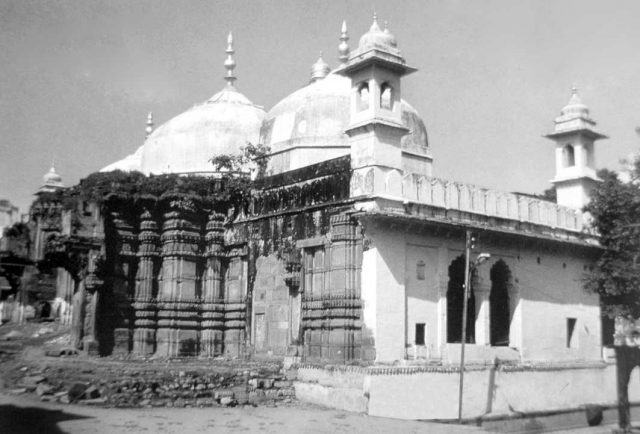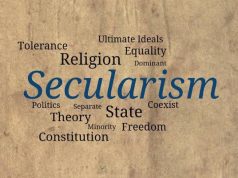The recent ruling by the Varanasi District Court permitting Hindu prayers in the Gyanvapi mosque complex’s sealed basement area (Vyas Ka Tekhana) has sparked a complex and multifaceted discussion that goes beyond the immediate ramifications and explores the intricate relationship between religion, justice, and democracy in India. This action becomes a symbol of the larger struggles that a pluralistic and diverse society has in trying to strike a balance between religious liberties and the laws intended to preserve social harmony.
The Varanasi District Court’s decision, which was based on an application submitted in September 2023 by Shailendra Kumar Pathak, a priest requesting permission for Hindu prayers in the closed basement of the Gyanvapi mosque, is reminiscent of historical occurrences, most notably the 1986 Babri Masjid incident. The All India Muslim Personal Law Board (AIMPLB), which has noticed a trend of mosque attacks since the construction of the Ram Mandir, has expressed alarm.
The criticism leveled by the AIMPLB at the Varanasi District Court’s ruling focuses on what they consider to be a breach of The Place of Worship (Special Provisions) Act, 1991, which was created to prevent the conversion of places of religious worship. Muslim leaders apologize for the puja’s sudden start and express suspicion that the complainant and the administration were conspiring. They emphasize disparities in past claims and fight for a fair presentation in court, closely examining the district judge’s decision-making process and timeliness.
The Gyanvapi situation has become even more complex with the notice that the Allahabad High Court recently sent to the mosque committee. The revision application contests the district judge’s ruling from Varanasi, particularly the denial of ordering the Archaeological examination of India (ASI) to carry out an objective scientific examination of the mosque’s wazukhana area. Historical details that further polarize the narratives are introduced by the ASI assessment conducted in 2023, which concluded that a sizable Hindu temple existed at the location prior to the construction of the Gyanvapi mosque. Regarding the case’s listing following the passage of the Places of Worship Act in 1991, the AIMPLB raises concerns.
The Varanasi District Court’s ruling is welcomed by the Vishwa Hindu Parishad (VHP), which points to previous puja rituals up to 1993, when they were purportedly discontinued by the government. On the other hand, the AIMPLB highlights the possible concerning trend that targets mosques by drawing comparisons between the Gyanvapi case and the Babri Masjid tragedy. Muslim leaders criticize the court’s impartiality, citing the judge’s decision from the previous day. This series of instances casts severe question on the legal system’s impartiality in addition to widening the religious gulf.
Muslim leaders question the verdict made by the Varanasi District Judge and express deep unhappiness with it. Concerns about the possible deterioration of justice for minority communities are heightened by the Supreme Court’s protracted silence on the Place of Worship Act of 1991. Senior Advocate Dushyant Dave raised concern that the judiciary would be turning into a “majoritarian judiciary,” which poses important issues regarding the availability of justice in a system that is seen to be prejudiced.
Muslim officials have voiced worries about other places of worship, including as the Sunheri Masjid in Delhi and the Shahi Eidgah in Mathura, in addition to the Gyanvapi mosque. Anxiety is increased by the larger pattern of erroneous claims to other places of worship, which highlights the need for immediate action to safeguard marginalized groups and minority communities. The leaders emphasize the need to maintain the impartiality and dignity of the legal system, both of which they feel have been jeopardized in this particular case.
The complex dance between religious convictions and the legal structures intended to regulate a heterogeneous community is best exemplified by the Gyanvapi debate. It emphasizes how difficult it is to strike a balance between the freedom to follow one’s religion and the need to keep places of worship from being converted or altered. The conflict between legal regulations and historical claims is a reflection of the continuous effort to bring faith and the changing dynamics of a contemporary, democratic India together.
The Gyanvapi debate serves as a metaphor for India’s larger struggles to maintain its unique diversity of cultures and religions. It draws attention to the fine line that must be drawn in order to include the various customs and beliefs into a legal system that guarantees equality and justice for all. A balanced approach that respects the ideals of a contemporary, secular democracy while acknowledging historical legacies is required when faith and legal principles collide.
Muslim leaders ask for time to discuss their concerns with India’s President and Chief Justice in a democracy where courts are the last arbiters of justice. By addressing the problems at the highest level, our outreach hopes to persuade decision-makers to take action in defense of the equality and fairness that are the foundation of our democratic country.
The Gyanvapi Mosque debate is a multifaceted affair, interwoven with legal frameworks, historical claims, and religious sentiments. There are serious questions regarding the future of justice and democracy in India raised by the conflict between the ruling of the Varanasi District Court and the terms of The Place of Worship Act, 1991. The Gyanvapi Mosque controversy and its wider ramifications for religious harmony and the rule of law in the nation will be greatly impacted by the forthcoming hearings and the appeal to the Allahabad High Court. As this complex dispute develops, it raises important questions about how best to strike a balance between historical legacies, religious freedoms, and democratic ideals. The way forward demands serious thought in order to preserve the fundamental principles of justice, equality, and pluralism that characterize India as a varied and democratic country as well as to settle the Gyanvapi conflict. Maintaining the values that have traditionally been the cornerstone of a peaceful and inclusive India will be necessary for navigating these difficult waters, which call for encouraging open communication and understanding. By adhering to these values, India may maintain its status as a functioning democracy where everyone has access to justice and a variety of views are heard.






